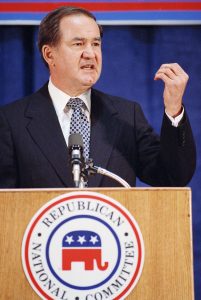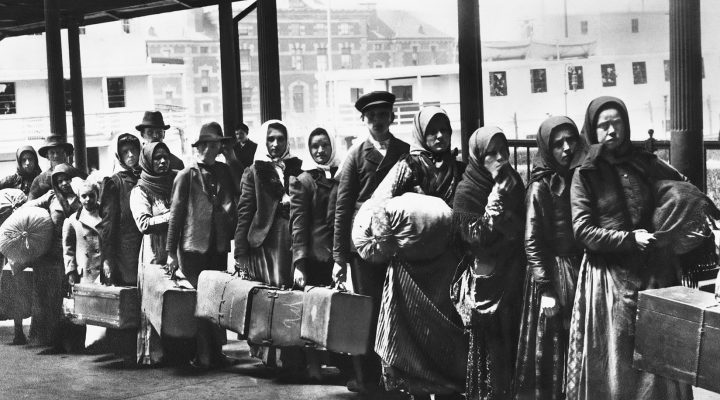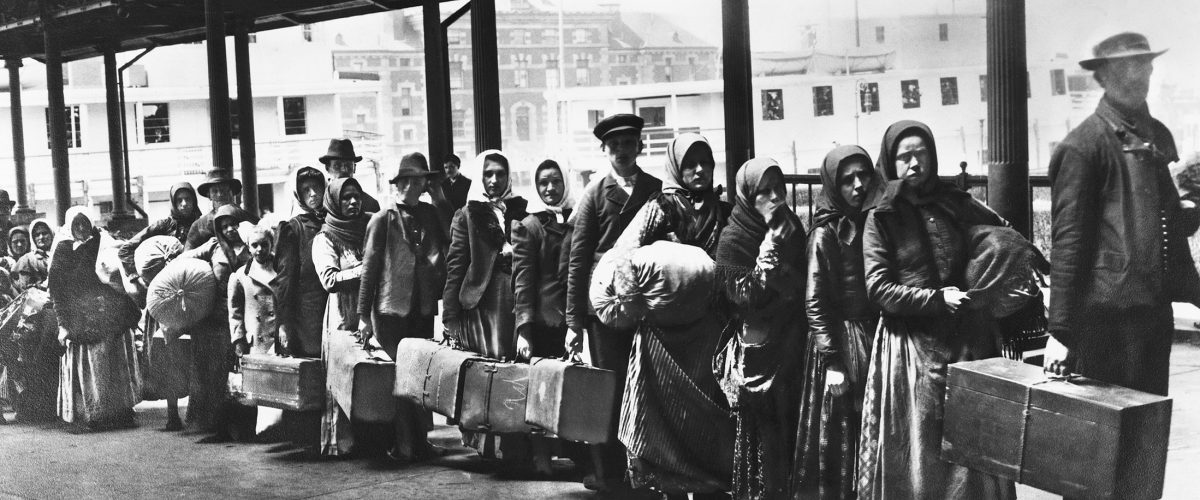This year is the 100th anniversary of the 1924 Immigration Act, which limited the number of immigrants allowed entry into the United States through a national origin quotas. The quotas provided immigration visas to 2% of the total number of people of each nationality in the United States as of the 1890 national census. It completely excluded immigrants from Asia.
As the U.S. presidential election approaches, immigration once again is a divisive issue. More than 60% of the electorate considers immigration a top concern. A dark, apocalyptic narrative has entered the American consciousness, and people fear an influx of immigrants, whether real or perceived.
The United States is “less white” than it once was.

On Nov. 11, 1954, Florence Goldfarb, 8; mother, Edith, and Sharon, 5, celebrate American citizenship. (Bettman Collection/Getty Images)
For more than 50 years, America was whiter by design, according to Jia Lynn Yang, national editor at The New York Times and author of One Mighty and Irresistible Tide. In the book, she explains how immigration laws were skewed against migrants from the Americas and “unwittingly helped spawn a shockingly unequal system” that would lay the groundwork for the undocumented migrant crisis to come.
Of all the books on immigration recently, one of the best is Jonathan Blitzer’s Everyone Who Is Gone Is Here. A staff writer for The New Yorker, Blitzer provides an intelligent journey through the maze of American immigration policy. He illustrates how thin the lines are between success and disaster.
Blitzer observes that American immigration policy offers a master class in shortsightedness. The U.S. trained Salvadoran military units and armed Nicaraguan contras. The violence in the region led to thousands migrating to the U.S. Central Americans came to the U.S., to cities including Los Angeles, where gangs like MS-13 sprouted out of self-preservation. In response, we deported gang members and sent the violence back to the same region. The resulting bloodshed prompted another mass migration to the United States. All the while, Blitzer notes, an uneven patchwork of policy reforms and harsher border measures flooded the asylum system, pushing migrants farther into the desert and into the hands of smugglers.
“Violence begat violence in a ceaseless cycle of ill-conceived attempts to kick the can down the road.”
Violence begat violence in a ceaseless cycle of ill-conceived attempts to kick the can down the road.
America’s policies compound the immigration crisis. President Barack Obama endorsed the book even though Blitzer writes Obama was branded a “deporter in chief,” and Obama’s pragmatism sometimes “blurred into conservatism.” Perhaps Obama’s endorsement is a way to face the truth Blitzer tells: ‘Immigration policy is governed by a politics of permanent crisis” and “politics is a form of selective amnesia.”
Immigration issues in the U.S. always have faced the turbulent seas of democracy, a small boat adrift in the ongoing struggle.
“Opportunistic politicians” exacerbate “unstable perversions of democracy” fostered by an “absence of adequate civic education.” The illiberal populism and nativism of rightwing demagoguery is a perversion of democracy. It is, as Josiah Ober observes, “an outburst of political polarization, marked by a rhetoric of demonization, that feeds off racial strife and exclusionary nationalism and projects a fierce hostility toward liberal values of tolerance.”
Any attempt to understand the dynamics of immigration requires an overview of two powerful forces in American politics: Populism and nativism.
Populism
Populism seems to defy definition because it lacks stable content. “As a doctrine or as a movement, it is elusive and protean. It bobs up everywhere, but in many contradictory shapes,” writes Dwayne Woods in The Many Faces of Populism.
Michael Kazin argues populism is accessible to all “those who claim to speak for the vast majority of Americans who work hard and love their country.” Ordinary people are a virtuous assembly arrayed against demonic enemies that are self-serving and undemocratic.
Michael J. Lee: “Populism begins with the constitution of a virtuous ‘people,’ then envisions a robust ‘enemy,’ decries the current ‘system,’ and finally finds the promise of reform in ‘apocalyptic confrontation.’”
Nativism
Nativism is the politics of protecting the interests of white Americans over those of immigrants.
“Nativism is the politics of protecting the interests of white Americans over those of immigrants.”
America has experienced spasmodic outbreaks of nativism — a movement where the white natives get scared and believe African Americans are going to steal their women, the Irish Catholics are going to destroy Protestant Christianity and overturn Prohibition, the Chinese are going to take all the jobs, the Germans and the Japanese are our sworn enemies. A nativist outbreak requires only the presence of some immigrants who are different and a small group of frightened white males.
I have not found a better example of the deep emotional power of nativism than J. Frank Norris, pastor of First Baptist Church of Forth Worth, Texas, from 1909 to 1952. Historian Barry Hankins, in God’s Rascal, outlines how Norris went from a populist to a Southern fundamentalist to an American nativist to a white supremacist. Hankins observes, “It was a short step from anti-Catholicism to expressions of American nativism and Ango-Saxon superiority.”

J. Frank Norris
Norris, for instance, argued only Protestants could be patriots. He then added Anglo-Saxon to his requirement for being a real American. Norris seamlessly mixed his nativism and white supremacy with the Bible and the church.
“Let others do as they may,” he said. “As far as we are concerned …. we stand for 100% Americanism, for the Bible, for the home, and against every evil and against every foreign influence that seeks to corrupt and undermine our cherished and Christian convictions.”
Norris feared Roman Catholics would take over the free institutions of the nation.
Hankins reports Norris once claimed the government should investigate all foreigners, “deporting the ones who were anarchists.” In Norris’ mind, Catholic cardinals in America should be put on ships loaded with bombs and sent out to sea to be blown up.
The 1928 presidential election aroused an ugly strain of American nativism against the Democratic candidate, Alfred E. Smith, a Roman Catholic. Norris warned immigrants would take Americans’ jobs. He supported the Immigration Act of 1924 because it virtually ended immigration of Southern Europeans.
For Norris, Alfred Smith and New York City represented the real threat to America. He said: “New York is the world’s largest Jewish city. New York is the worlds’ largest Negro city. New York is the world’s largest Italian city. New York is the world’s largest Irish city.” Norris turned his full fury on defeating Smith in the election for president. His American nativism never had a larger expression.
In The Immaculate Mistake, I find the rhetorical parallels between Norris and Donald Trump a major reason for my thesis: Evangelicals gave birth to Trump.
Patrick Buchanan

Pat Buchanan gestures during a speech at the Republican National Committee Summer Meeting in Philadelphia, Friday, July 14, 1995. (AP Photo/George Widman)
More recently, the flag of American populism/nativism has been flown by Patrick Buchanan. Here we witness the paranoid populist style of Sen. Joe McCarthy combined with a stern anti-immigration and nativist element. I trace the current surge of nativism in the United States to an earlier turn by the Republican Party away from the inclusion of immigrants in our national life. Buchanan set the course toward the anti-immigration campaign of 2024.
The anti-immigrant policies of Buchanan are clear in his 2006 book In State of Emergency: The Third World Invasion and Conquest of America. Buchanan wrote: “It needs to be said again: If we do not solve our civilizational crisis — a disintegrating culture, dying populations, and invasions unresisted — the children born in 2006 will witness in their lifetimes the death of the West. We must stop the invasion.”
Buchanan had a full-blown plan for immigration:
- Stop all immigration
- Eliminate amnesty for immigrant workers
- Build a permanent fence
- No more “anchor babies” — immigrant babies born in the U.S.
- Stop “chain migration” — family reunification policy
- End dual citizenship
- Remove the “magnets” — the benefits and incentives for illegal immigrants
- Remigration
A better story is required
If the aim is to recover a democratic culture, critics must deploy democratic means to advance democratic ends. There must be an intelligent, rational response to the negative emotions of nativism and racism. A better story is required.
At this point, neither Republicans nor Democrats have provided this better story. Democrats have not exactly been a people of open arms, open hearts and hospitality. In response to the fears of voters, Democrats have lurched rightward on immigration. President Biden has signed executive orders that severely curtail asylum cases. Vice President Kamala Harris has campaigned for tougher border restrictions.
“They pretend we can keep the current system working, with more restrictions, even though the excuses are running out and the nation is filling with more resentment and rancor.”
Some Democrats and progressive Christians are dishonest about their support for immigrants and the implications of those ideas. They hide behind what they call a reasonable immigration plan whose only virtue appears to be the criticism that Trump killed it. They don’t practice the hard-core nativism of Trump and MAGA. They don’t pretend the immigration issue is unreal. But their soft denial is subtle, and more closely aligned with the “way the wind blows” than with the interests of immigrants and Americans. They pretend we can keep the current system working, with more restrictions, even though the excuses are running out and the nation is filling with more resentment and rancor.
Instead of blatant racist anti-immigration nativism or soft denial, the story of the value of immigrants to the American story needs to be told out loud.
There is a better, healthier, more truthful immigrant story. Heather McGee, in The Sum of Us, shows how immigration has proved to be a win-win for locals as a means of repopulating and revitalizing small towns across the country.
She offers a trip to Lewiston, Maine, as a counter story to the lies told recently about Springfield, Ohio. According to McGee, the secret to Lewiston’s success is thousands of refugees from the Somali Civil War moving there. Soon other African refugees, from the Congo, Chad, Djibouti and Sudan moved to Lewiston.
City planner Phil Nadeau said, “The refugee arrivals … are filling apartments that were vacant for a long time. They’re filling storefronts of Lisbon Street that were vacant. They’re contributing to the economy.”
Referring to the African immigrants from what Trump called “shithole countries,” Nadeau calls them the “new Mainers” as they help revitalize Lewiston. He boasts that while other Maine small towns have plummeting real estate values, fleeing young people and shuttering schools, Lewiston is building new schools and creating the jobs that come with that development. A bipartisan think tank calculated that Maine’s African immigrant household contributed $94 million in state and local taxes in 2018.
“In the towns gaining population, one if five owe the entirety of their growth to immigrants.”
Pick a state, and you’ll find this same story repeated in one corner or another. Kennett Square, Pa., is now 50% percent Latinx, mostly from Mexico, and it’s a community given new life by the families of migrant workers at the local mushroom farms.
Dalhart, Texas, grew by 7% from 1990 to 2016 because of Latinx families. They came to Dalhart to work on the potato farms.
According to McGhee, immigration has helped soften the blow in the more than 2,600 rural communities losing population. In the towns gaining population, one in five owe the entirety of their growth to immigrants.
Immigrants have started businesses, gained education, contributed to the tax base and participated in civic life. This is the better story that negates the populist nativism of our past rooted in demagogues like Norris and Buchanan.
The unknown writer of Ecclesiastes sings, “For everything there is a season, and a time for every matter under heaven.” In America, it is high time to laugh and dance in the glory of diversity and inclusion. It is time to tear down the ancient walls of fear, hatred, racism and division and stitch together the common good of all.
The better angels of the American spirit know this is the better way.

Rodney Kennedy
Rodney W. Kennedy is a pastor and writer in New York state. He is the author of 11 books, including his latest, Dancing with Metaphors in the Pulpit.
Related articles:
Yo-Yoing of U.S. immigration policy is bad for the world, experts warn
79% of Republicans favor rounding up illegal immigrants into camps before deportation
How the party of business came to embrace anti-immigrant policies bad for business | Analysis by Mark Wingfield


